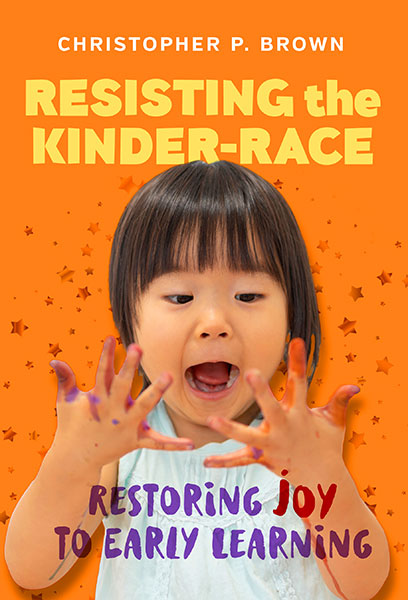Professors: Request an Exam Copy
Print copies available for US orders only. For orders outside the US, see our international distributors.
Publication Date: July 23, 2021
Pages: 216
Series: Early Childhood Education Series

Kindergarten has changed. Many believe that it no longer reflects a nurturing environment but, instead, has become a race for children to learn skills so they are ready for the academic achievement tests that they will take continuously throughout their time in school. Resisting the Kinder-Race examines how the race came about, why it must change, and how all stakeholders in the early childhood and elementary school communities must take part in the reform process. The author draws on his own research to consider how the Kinder-Race might be reimagined through more democratic principles of schooling. Brown offers both practical and political strategies that can alter the day-to-day practices of the kindergarten classroom and the policies that currently define PreK–12 education in the United States. This resource will help readers see kindergarten as an educational environment that expands the learning of every child.
Book Features:
Christopher P. Brown is a professor in the Department of Educational Leadership and Policy at the University of Texas at Austin.
“ Resisting the Kinder-Race: Restoring Joy to Early Learning is a highly readable, organized, and insightful book that stresses the complexity of today's kindergarten while also offering realistic ideas for change.”
—Journal of Language and Literacy Education
“Brown offers an insightful reading with various perspectives on the Kinder-Race and the changes needed to occur to return to a more child-focused kindergarten learning environment.”
—Teachers College Record
“This book is the first comprehensive treatment of kindergarten education in recent memory. I totally endorse Chris Brown’s concept of re-routing the Kinder-Race to a focus on the expansion of learning. I recommend this research-based guide because it provides practical and political tools for challenging the discourses that dominate public education today.”
—J. Amos Hatch, professor emeritus, University of Tennessee
“Brown’s reframing of the current infatuation with neoliberal, outcome-focused education for young children brings hope to those of us who hold fiercely to democratic-centered, individualized, and culturally sustaining pedagogies in preschool and kindergarten. Most importantly, he helps stakeholders—teachers, families, administrators, and policymakers—conceive of a way to resist and move forward together.”
—Mary Benson McMullen, professor of early childhood education, Indiana University
Contents
Acknowledgments xi
1. Why Examine the Changed Kindergarten? 1
Origins of My Interest in the Changed Kindergarten 2
Why This Book? 3
How No Child Left Behind Has Failed 4
The Purpose of This Book 5
My Own Sense of Reality 9
Outlining the Rest of the Book 11
2. How Kindergarten Transitioned From a Garden to a Race 13
Froebel’s Kindergarten 13
The Expansion of Kindergarten in the United States 14
Kindergarten Post-WWII 16
A National Focus on the Academic Performance of Children 17
The Early Childhood Community Responds to the Push for Increased Academics 18
A New Focus on Kindergarten Readiness 18
Improving America’s Schools Act 19
No Child Left Behind 20
Accountability Shovedown Moves Into Prekindergarten Classrooms 21
Readying Children for Kindergarten 22
The Achievement Gap 22
The Construct of School Readiness 23
The Impact of Policy on Kindergarten Teachers’ Curricular Decisionmaking 25
Not Just Standards-Based Accountability Reform 27
3. Experiencing the Kinder-Race 28
The Significance of the Kindergarten Year for Student Learning 29
The Day-to-Day in Kindergarten 30
Making Sense of Kindergarten 30
Culturally Sustaining Pedagogy 31
Kindergarten in Texas 32
What Do Kindergartners “Do” on a Daily Basis? 36
What Happens in Literacy and Mathematics During a Typical Day? 37
Summing Up a Day in the Kinder-Race 54
4. Figuring the Kinder-Race Within the Worlds of Schooling 57
Why Texas and West Virginia? 58
The Figured World of the Kindergarten Classroom 58
How the Kindergartners Figured Their Own World 59
How Kindergartners Would Like to Reroute the Kinder-Race 62
How the Adults Within the Worlds of Elementary School Figured the Kinder-Race 64
How Family Members Figured Kindergarten 66
How Families Hoped to Reroute the Kinder-Race 70
How Kindergarten Teachers Figured Kindergarten 73
Teachers Rerouting the Kinder-Race 79
School Principals 83
Principals Rerouting the Kinder-Race 87
The Figuring of Kindergarten by Those Whose Orbits Revolve Around the School 90
5. The Tension Between Fostering Democratic Students Versus Individualized Performers 92
Countering Neoliberalism 92
Texas and West Virginia Stakeholders 93
Texas Stakeholders 94
West Virginia Stakeholders 108
National Stakeholders 119
National Stakeholders Rerouting the Kinder-Race 123
Struggling to Reroute a Race That Prioritizes Economics Over Democratic Learning 130
6. Kindergarten Is the Expansion of Learning 131
Rerouting the Kinder-Race 131
The Strict Father and Nurturant Parent Metaphors 133
Defining the Kinder-Race Using Lakoff 134
Rerouting the Kinder-Race: Kindergarten Is the Expansion of Learning 135
How to Engage in the Expansion of Learning 137
Supporting and Engaging Stakeholders in Expanding the Learning of Kindergartners 144
Moving Into the Political 150
Resources to Help Create Schools to Expand Learning for All Children 155
Moving Forward in Expanding the Learning of All Children 156
Appendix: Research Design 159
Notes 165
References 168
Index 191
About the Author 204
Professors: Request an Exam Copy
Print copies available for US orders only. For orders outside the US, see our international distributors.